06 Mar 2024
The COMBAT-AMR Program: Phase I achievements and the path forward
As Phase I of the COMBAT-AMR program comes to a close, the multi-year initiative has shown the key role of cohesive action against antimicrobial resistance (AMR) and highlighted the significant impact of bolstering in-country capacities, with many achievements in the fight against the threat of AMR in Pacific Island Countries.
Funded by the Department of Foreign Affairs and Trade (DFAT) Centre for Health Security under the Australian Government Health Security Initiative for the Indo-Pacific Region, COMBAT-AMR was designed with the vision of achieving four core outcomes across each participating country: enhancing infection prevention and control (IPC) systems within major health facilities, elevating antimicrobial stewardship (AMS) practices, augmenting the capacity for laboratory surveillance of AMR, and fostering a One Health approach to AMR surveillance that bridges the human and animal health sectors.
COMBAT-AMR was led by the WHO Collaborating Centre for Antimicrobial Resistance at the Doherty Institute, in partnership with the Burnet Institute, Asia-Pacific Centre for Animal Health, Alfred Health Infectious Diseases, WaterAid, PRIDA, the Pacific Pathology Training Centre, WHO Collaborating Centre for AMR Surveillance at the Brigham and Women’s Hospital, and Massey University.
Working collaboratively towards outcomes has been integral in supporting AMR management in the Pacific, with a shift towards more resilient health systems capable of withstanding the multi-faceted challenges posed by AMR. Through a blend of technical assistance, capacity-building workshops, and the establishment of pivotal infrastructure, COMBAT-AMR has supported the regional movement towards enhanced health security.
To work toward these outcomes, the COMBAT-AMR team has collaborated with country healthcare leaders to navigate the complexities of AMR in diverse healthcare settings, leveraging the strengths of each participating country to foster solutions that are tailored to local needs. A key factor in ensuring long-term, sustainable growth has been the adoption of country-led approaches, with local stakeholders guiding the direction taken with implementation measures.
Here, we delve into the key milestones reached by the project and reflect on the impact these have had on enhancing AMR management within the region.
Development and launch of antimicrobial treatment guidelines
A cornerstone achievement of the COMBAT-AMR project has been the development and launch of antimicrobial treatment guidelines tailored for the animal health sector in Fiji and Samoa. These guidelines are an essential step in in ensuring responsible antibiotic use, providing recommendations for the most appropriate antimicrobial treatment of the most common diseases of the major domestic animal species. This initiative demonstrates the importance of full integration of engagement with the animal health sector into the broader strategy of combatting AMR, recognising the close relationships and interdependence of optimal human, animal, and environmental health.
The guidelines were showcased at the Pacific One Health Antimicrobial Resistance Symposium held in Fiji last year, and have been enthusiastically received by the animal health community in the region. By providing a clear framework for antimicrobial prescribing, these guidelines not only support the health and welfare of animals, but also contribute to the overall reduction of the risk of AMR within the Pacific region.
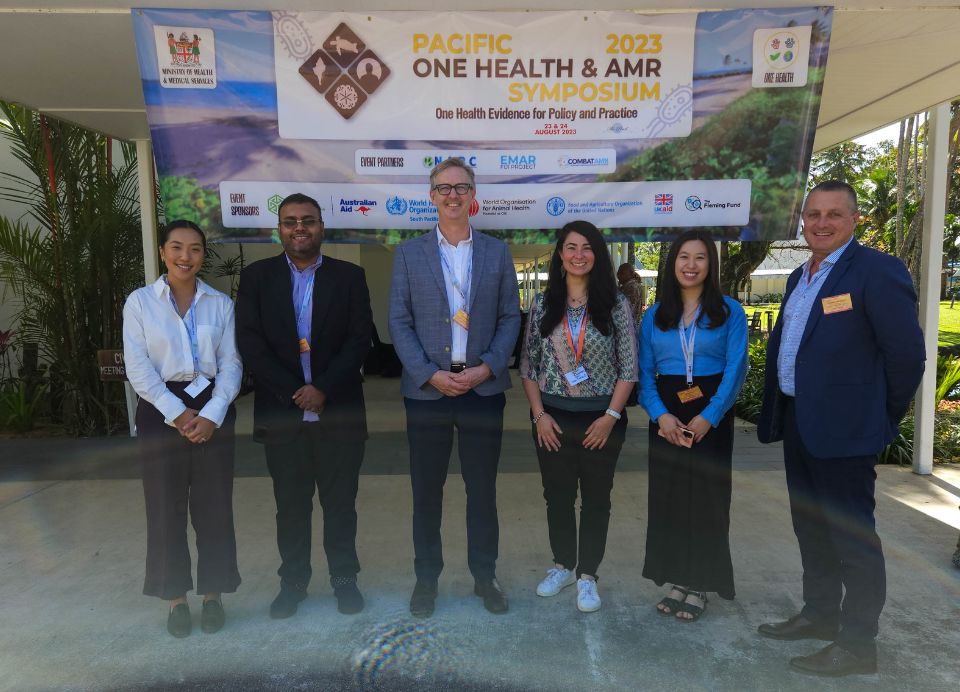
Members of the COMBAT-AMR team at the Pacific One Health AMR Symposium, 2023
"The collaborative development of antimicrobial use guidelines with our colleagues in Samoa and Fiji has not only created critical resources for people working in animal health in these two countries; it has also provided a basis for future design of antimicrobial stewardship in animal health in the Pacific, resulted in a template approach for development of guidelines with other countries in the region, and demonstrated the role of a One Health approach in delivering improved health outcomes for domestic animals and humans."
- Professor Glenn Browning, Animal Health Lead, COMBAT-AMR
Establishment of alcohol-based hand rub facilities
In a bid to strengthen infection prevention and control (IPC) measures and reduce the impact of supply chain challenges, the COMBAT-AMR project facilitated the setup and launch of alcohol-based hand rub (ABHR) facilities in Papua New Guinea and the Solomon Islands. This initiative, aimed at ensuring a sustainable supply of ABHR, critically supports healthcare facilities in maintaining high standards of hygiene and reducing the transmission of infections, including those resistant to antibiotics.
The ABHR facility at Port Moresby General Hospital (PMGH) in PNG has had a profound impact on IPC practices. By enabling the local production of ABHR, this facility has overcome previous challenges of supply and accessibility, allowing healthcare workers to maintain optimal hand hygiene practices without the previous handicaps concerning the availability of this resource. This has also integrated effectively with the ‘SWIM’ mentoring sessions attended by the PMGH staff, which encompasses the principles of antimicrobial stewardship; water, sanitation and hygiene (WASH); IPC; and microbiology laboratory testing.
This achievement is a clear example of the project's commitment to tangible, practical solutions that address the foundational aspects of AMR management.
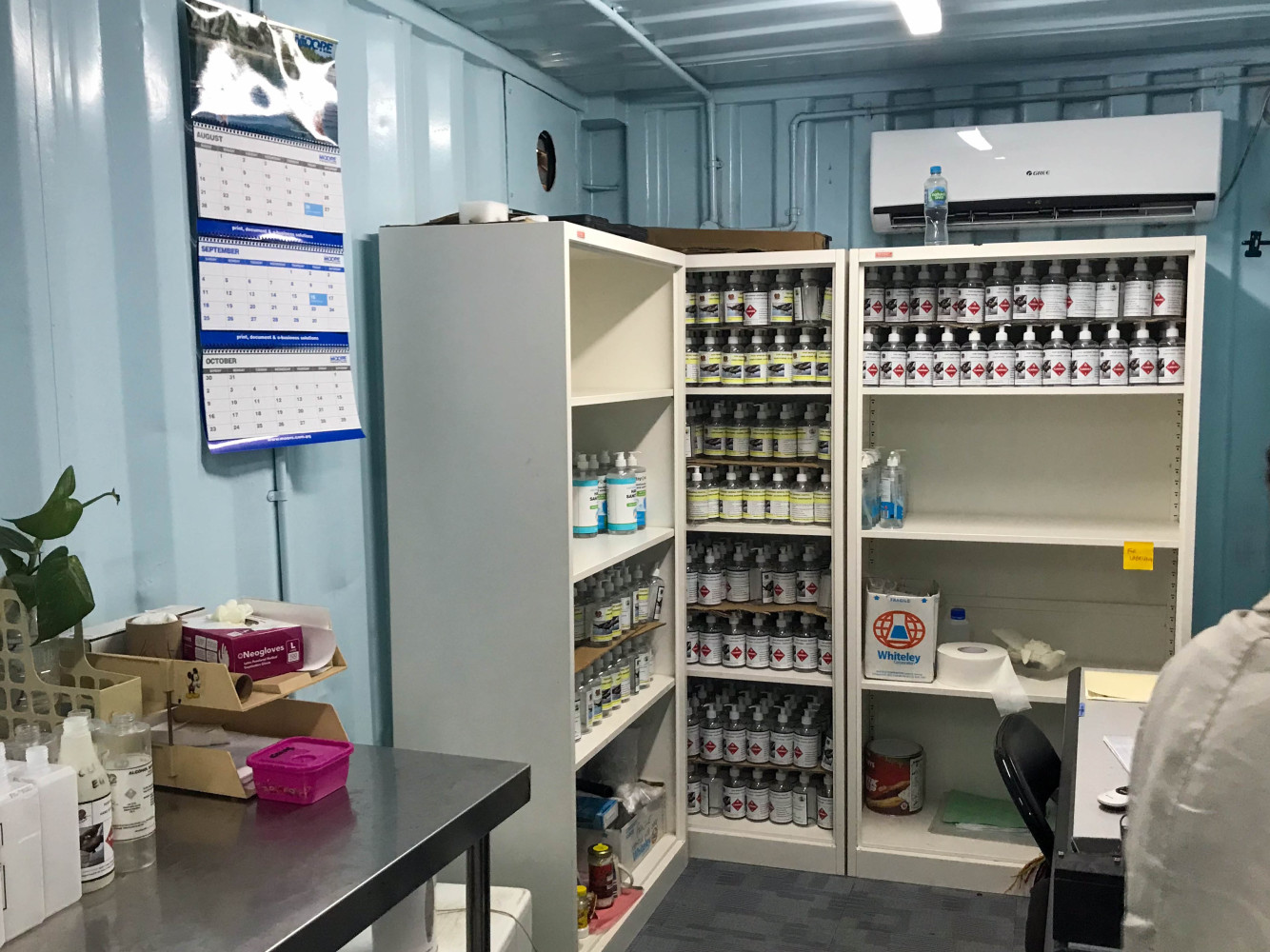
The ABHR Facility in Port Moresby, 2022
"The establishment of the ABHR facility at Port Moresby General Hospital marks a significant leap forward in our efforts to enhance infection prevention and control. This initiative not only strengthens our ability to combat antimicrobial resistance but also underscores the importance of local production for sustainable healthcare solutions."
- Dr Gabriella Ak, Clinical Microbiologist, Port Moresby General Hospital
Antimicrobial stewardship (AMS) training workshops
A key focus of the COMBAT-AMR project has been to enhance the antimicrobial stewardship (AMS) capabilities of healthcare professionals through targeted training workshops. These workshops, co-funded by local partners such as the Essential Medicines Authority in Fiji, have been instrumental in building a robust AMS framework across countries in the region. By focusing on auditing, reporting, adult learning, and capacity building, the workshops have equipped participants with the necessary skills to implement effective AMS practices within their institutions. The utilisation of the Western Pacific Antimicrobial Stewardship Program Online Educational Modules (WPAMS) has had a broader impact, offering an interactive tool for ongoing learning and application across the spectrum of healthcare workers.
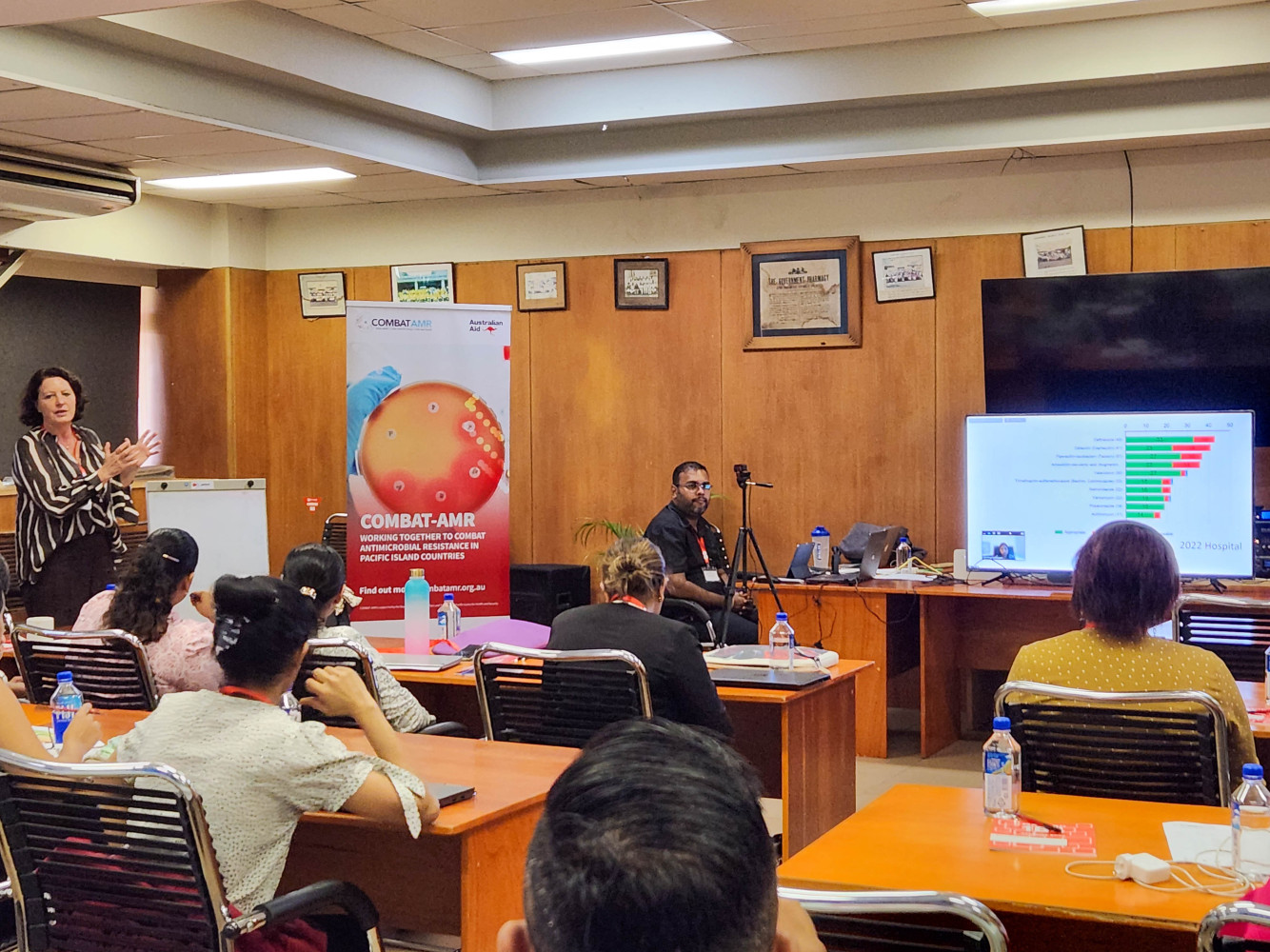
Prof Kirsty Buising facilitating a workshop on AMS for hospital staff 2023
"The AMS training workshops conducted by COMBAT-AMR have been integral in strengthening antimicrobial stewardship capacity across the Pacific. By empowering healthcare professionals with the tools and skills to optimise antibiotic use, we are taking proactive steps to mitigate the threat of AMR."
- Professor Kirsty Buising, Co-Lead, COMBAT-AMR
Laboratory capacity and development
The ability to effectively diagnose and treat pathogens with AMR in hospitals can be influenced by improving the local capacity of laboratories to perform surveillance. COMBAT-AMR has supported capacity building for the rapid and accurate diagnosis of pathogens with AMR, and improved capacity to undertake extended susceptibility testing.
Notably, the initiative facilitated remote and hands-on training sessions tailored to enhance Antimicrobial Susceptibility Testing (AST) and supported the integration of local Laboratory Information Management Systems (LIMs) with WHONET, enabling laboratories to streamline the extrapolation of reports and paving the way for future uploads to the Global Antimicrobial Resistance Surveillance System (GLASS). Weekly plate round discussions emerged as a dynamic platform for examining novel or complex laboratory or clinical cases, offering specialised troubleshooting, and addressing IPC issues. The establishment of a formal referral pathway for Carbapenemase-Producing Organisms (CPO) sequencing with Fiji further exemplifies the project's commitment to supporting laboratory surveillance capabilities, setting a standard for accurate and timely detection of AMR pathogens.
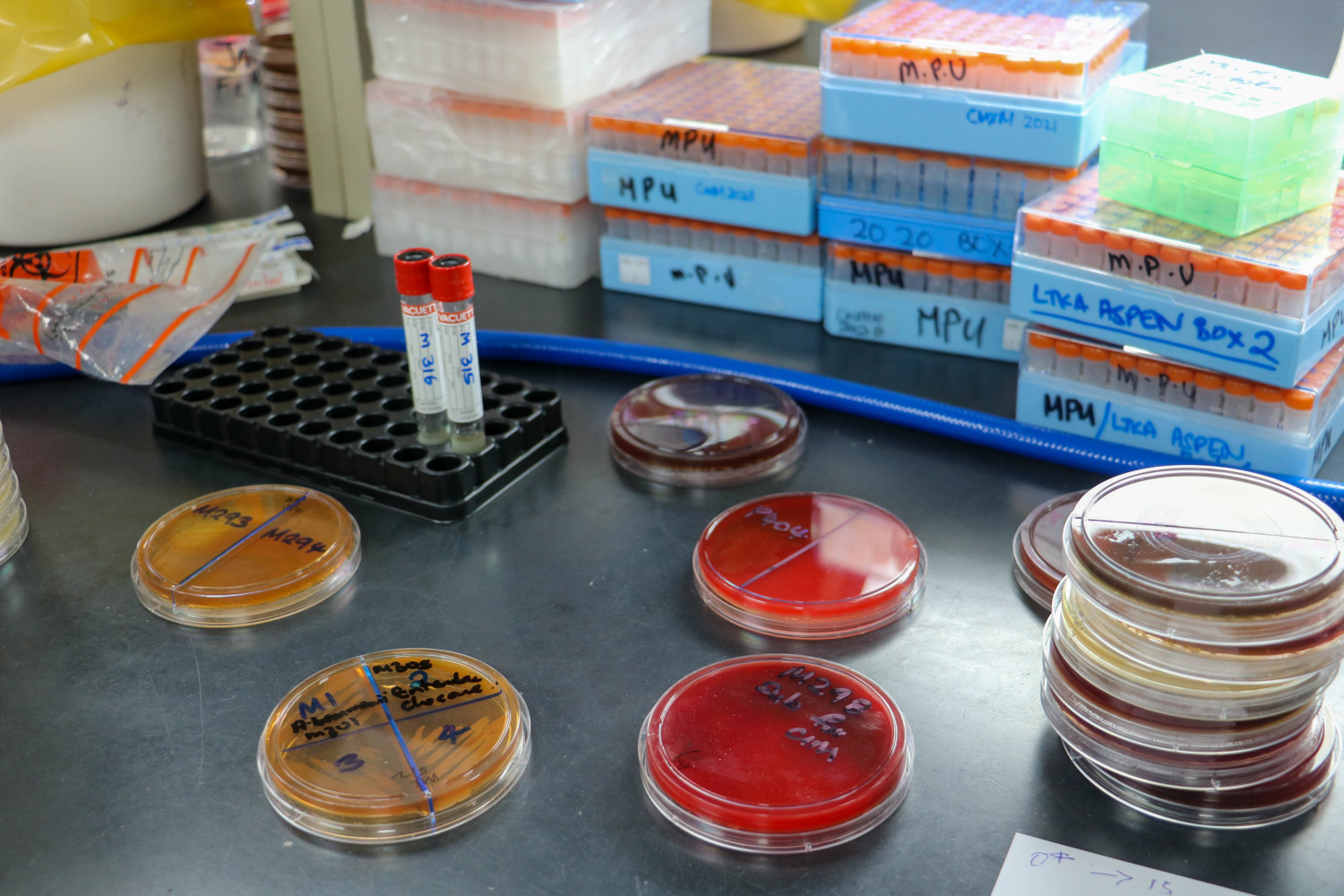
Plates used for the screening of AMR pathogens in the microbiology laboratory, Fiji
"The advancements in local laboratory capacities and surveillance systems through the COMBAT-AMR project has been about building a resilient infrastructure that can not only withstand the current challenges of AMR, but also anticipate and respond to future threats. This proactive approach is essential for maintaining the efficacy of antimicrobials and ensuring the sustainability of our healthcare systems."
- Professor Ben Howden, Co-Lead, COMBAT-AMR
Observerships to Melbourne
The COMBAT-AMR program hosted observerships in Melbourne as a key delivery approach to build capacity across AMS, laboratory and clinical management. Healthcare professionals from Fiji and the Solomon Islands underwent intensive two-week training sessions at the Peter Doherty Institute for Infection and Immunity.
The opportunity to undertake training across multiple hospital and laboratory sites across Melbourne provided exposure to best practice approaches, and the program aimed to equip participants with comprehensive skills and knowledge for combating AMR effectively, with strategies to apply learnings into local Pacific contexts. This endeavour highlights the COMBAT-AMR project’s commitment to fostering a region-wide response to antimicrobial resistance through education and skill development, ensuring the transferability of learned practices to improve AMR management across the Pacific.
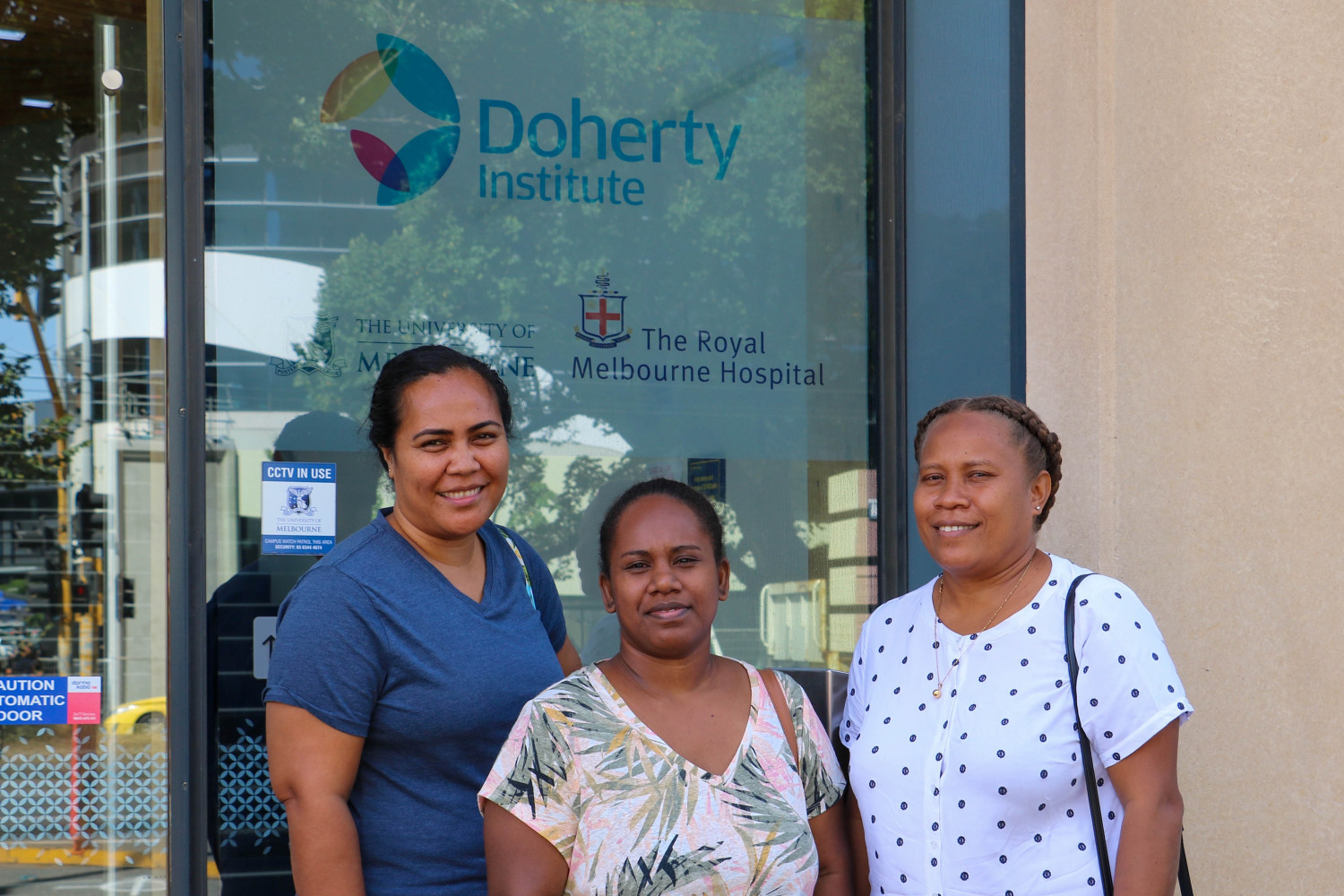
“Having the opportunity to bring key staff from institutions to Melbourne allows us to sustainably build up local capacity, with the learnings taken back and distributed further within the healthcare system. These staff members are now able to be strong advocates in their home institutions, enabling a coordinated, multidisciplinary approach to combatting the threat of AMR.”
- Dr Rod James, Medical Microbiologist, COMBAT-AMR
Reflections and future directions
As we reflect on the achievements of the COMBAT-AMR project's first phase, it's evident that the collaborative efforts have yielded significant strides in AMR management. The project has not only addressed AMR through a multifaceted approach but has also laid the groundwork for sustained action in the future.
Looking ahead, the potential for future work aims to build on these foundations, continuing the vital work of combatting AMR across the Pacific.
"The achievements of Phase I of the COMBAT-AMR project are evidence of the power of collaboration in addressing complex global health challenges. Through partnerships with local stakeholders and international organisations, we have made significant strides in enhancing AMR management across the Pacific."
"As co-leads of the COMBAT-AMR project, we are proud of the progress made during Phase I and look forward to building on these achievements moving forward. Our commitment to fostering partnerships, sharing knowledge, and implementing evidence-based strategies continues to grow as we continue our fight against antimicrobial resistance."
- Prof Kirsty Buising and Prof Ben Howden, Co-Leads, COMBAT-AMR
COMBAT-AMR works in partnership with government, National AMR Committees and public health counterparts in Fiji, Samoa, Solomon Islands and Papua New Guinea, to implement capacity building and training activities to support the prevention, diagnosis, surveillance and management of AMR pathogens, under the framework of National AMR Action Plans and priorities. COMBAT-AMR is supported by the Department of Foreign Affairs and Trade’s Indo-Pacific Centre for Health Security.


